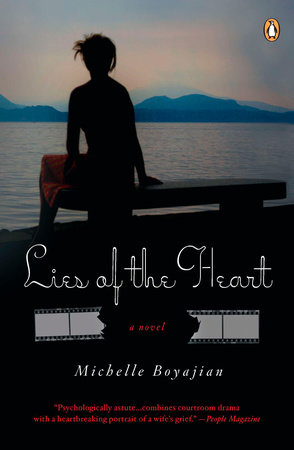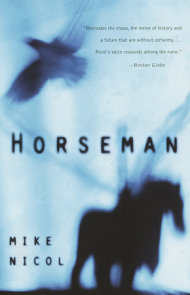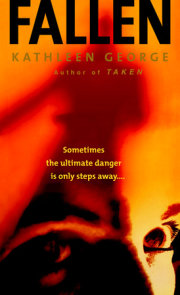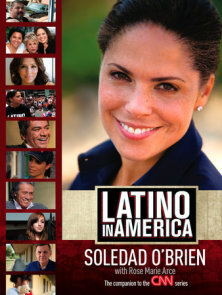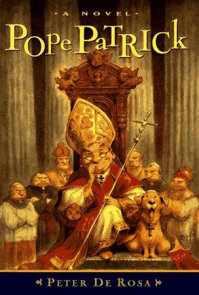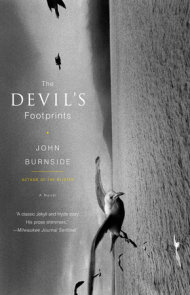READERS GUIDE
Questions and Topics for Discussion
INTRODUCTION
Less than a month after Katie Burrelli asks her husband Nick to temporarily move out of their home, he is shot at point-blank range by one of his speech pathology clients, a mentally retarded man with the IQ of a ten-year-old child. Now Katie sits inside the courtroom flooded by memories of Nick and full of vengeance toward Jerry LaPlante, the client she once loved like a son.
Everything from Katie and Nick’s chance meeting to their whirlwind courtship seemed guided by fate—at least that’s how Katie felt at the time. Just twenty-two when they met, she had spent most of her life feeling like an outsider in her own family, long overshadowed by the successes of her beautiful and charismatic older sister, Dana. But with Nick, Katie thought she had finally met a kindred spirit and “understood, for the first time in her life, the possibility of not always feeling alone in the world” (p. 38).
Soon after their chance meeting, a film professor praised Katie and her “eye for reading people” (p. 49) and inspired her to pursue a career as a documentary filmmaker. Ten years later—after harrowing days spent inside the courtroom—she seeks solace in this profession by reviewing footage of two Holocaust survivors whose young marriage blossomed inside the camps despite their lack of physical contact and the horrors they witnessed. But hearing Arthur and Sarah Cohen’s saga gradually points Katie toward her role in the failure of her own marriage, and the moments that led up to Nick’s death.
Jerry LaPlante, a giant yet vulnerable man, was regarded as one of Nick’s most successful cases—until he astonished everyone by turning a gun on Nick. Jerry had been brutally abused by his birth mother and he arrived at the Warwick Center with painful speech deficiencies and a debilitating fear of God’s vengeful presence, which appeared in everything from thunderstorms and cigarettes to a birthday cake blazing with candles. Because of Jerry’s disturbing past and his distrust of men, Nick was unable to coax him to participate in their therapy sessions. But then the program director, seeing Jerry’s fascination with Katie when she visited the center, enlisted Katie to reach out to Jerry; with her gentle encouragement and Nick’s persistence, they quickly became surrogate parents to the troubled thirty-eight-year-old man. Eventually, with his own room in their house and weekends and holidays spent together, Jerry flourished under their care.
But Nick and Katie’s marriage was not thriving nearly as well. Nick resented Katie’s emotionally stronger connection to Jerry, which fueled his professional insecurities; he frequently lashed out at her with criticism and verbal abuse that increased Katie’s questions about Nick’s past and added to her own doubts about herself and the true nature of their relationship. And while Nick’s fervent apologies and their impassioned lovemaking helped Katie feel empowered and reassured of Nick’s love, it was clear their problems went deeper than the usual marital tiffs. After Nick’s murder, Katie vows to help the prosecution convict Jerry, whose best interests she’d always promised to protect¬¬. But as she pushes forward and tries to dismiss the tender relationship she once shared with Jerry, she becomes more ensnared with questions and uncertainties about her marriage, Jerry’s reasons for killing a man they both loved, and her own murky responsibility in Nick’s death.
Delving into the tangled truth behind a young widow’s grief, Lies of the Heart will resonate with readers of Jodi Picoult and Luanne Rice, and marks debut novelist Michelle Boyajian as a stunning new voice in women’s fiction.
ABOUT MICHELLE BOYAJIAN
Michelle Boyajian is a graduate of New York University, Miami University, and the University of North Carolina–Wilmington, where she received an MFA and the Austin Robert Hartsook Fellowship in Creative Writing. Her most recent short stories appeared in Third Coast and Timber Creek Review, and were nominated for a Pushcart Prize. She currently lives in Wilmington, North Carolina.
A CONVERSATION WITH MICHELLE BOYAJIAN
Q. What inspired Lies of the Heart?
It was inspired by a series of events that happened the day before I moved from Ohio to North Carolina. My U-Haul was mistakenly leased to someone else, and my only option was to make a long trip out of town to arrange for another one. During this drive I was thinking about my brother, Joe, who is mentally retarded. My family was to arrive the next morning, and Joe and I had already decided that he would spend most of the car ride to North Carolina with me. So I was thinking about our recent conversations on the phone and imagining where our new ones might lead us the next day, because Joe has this ability to shift from what is called innocent to complex thinking in an instant, and it’s always such a surprise to me (his beliefs about the real Santa Claus living at the North Pole versus the helpers at the mall once dovetailed into a very complicated discussion about deception and greed). I was excited to see what my brother would come up with in our twelve hours together and certain that there would be plenty of reminders that he isn’t a child, even if he has the IQ of a ten-year-old and loves playing with toys.
While I was thinking about this, I was also half-listening to the radio and at one point there was a news update about a man who was indicted for a murder or another violent crime, and I found myself wondering what would happen if it were Joe facing this prison sentence. And then I suddenly pictured my sweet brother sitting in a jail cell, drawing pictures on the pad he takes everywhere with him, and the image was so scary and wrong that I started plotting elaborate prison breaks in my head. But the very cool thing that happened next was a flood of what-if questions, and that’s when I knew a book was starting to take shape. What would happen if a mentally retarded man with the IQ of a little boy murdered someone? What would make him do this and how would he try to explain his feelings and actions? How would his very simple and then complex reasoning intersect or get tangled up together? And what if this man actually knew and loved the person he killed? After a few minutes, I found myself plugging in answers to my growing questions, and by the time I returned home I had a very rough outline of the plot and the main characters.
Q. At what point in your writing process did you realize that Katie wasn’t a wholly reliable narrator? Can you describe some of the challenges writing from that perspective?
There were two decisions I made about Katie’s character before I started writing that made me realize almost immediately that she wouldn’t always be the best narrator of her own story. I knew that I wanted to begin the novel by showing her rage toward Jerry and her singular desire to see him convicted, but I also knew that she truly loved him and had spent years caring for him and protecting him. These things didn’t add up, which pointed to something very complicated about her inner life and prompted more questions about reliability that I wanted to explore. Why doesn’t she sympathize, at least a little, with Jerry’s situation? Why doesn’t she visit him or try to confront him? And why would she be completely clueless about the reasons he killed Nick? How could she spend so much time with Jerry and not see any signs that something was wrong?
The second decision was to make Katie someone who purposely removed herself from people and events, both personally and professionally. I wanted her to spend her early years watching other people from a distance and feeling like an outsider even in her own life, and I realized this behavior and attitude would naturally continue with age and her time behind a camera. And if she could divorce herself from people and interactions for the most part, but still believe that she understood them through simple observation, then her perceptions and conclusions would be a little skewed at times. Being a perpetual witness versus an active participant would obviously affect the way she interprets human behavior, thereby affecting her rendition of what happens around her. She can’t capture the complexities of life and turn them into cohesive narratives if she’s splicing and editing her world according to her own preoccupations and guesses. This makes her rather untrustworthy at times.
The biggest challenge was trying to keep Katie relatable and sympathetic. Even though she was my creation and I was writing her character, I still found myself getting frustrated with her at times. And I worried that this might happen with readers as well, so it was important to reel myself in a little when I was writing moments that highlighted her unreliability because the combination of mistrust and annoyance with a main character is enough to make people stop reading.
Q. The novel unfolds very cinematically, and Katie is a documentary filmmaker. Did you ever study film yourself?
I did study film at NYU, but as a screenwriter I only learned the rudimentary aspects of filmmaking. One class in particular did inform Katie’s process in the book. In that class I had been required to complete a short narrative from beginning to end—write the script, do the storyboards, set up lighting and sound, direct and shoot it, and then edit the final footage. When I began writing Lies of the Heart, most of the techniques and equipment I used were already obsolete. I also learned a lot about outdated and current forms of filmmaking from a professor at UNCW who writes and directs his own films. What probably helped the most, though, was simply watching many documentaries before writing about Katie’s observations or her time behind the camera. I tried to see each one through Katie’s lens, especially during the interview portions—what crucial moments she would probably miss or dismiss as unimportant, but particularly the ones she’d really zero in on. It was easy to imagine how someone who isn’t very self-aware might misread people and their gestures and mannerisms, especially if she’s preoccupied with personal troubles or fixated on love, as Katie often is in her life. After watching a few films, it became easier to predict Katie’s focus and reactions, and how she might try to uncover or spin an entirely different story than the one being told.
Q. Do you have sisters? If so, how much of the relationship between Katie and Dana is culled from your own experiences?
I have two—a biological sister, Robin, and a foster sister, Kelley—who are both two years older than me. They are my most trusted and closest friends in the world and they know everything about me, so I couldn’t really rely on my relationships with them to inform the many aspects of Katie and Dana’s dynamic, which involves a lot of secrecy and jealousy on Katie’s part. Robin is a social worker, however, so besides sharing crucial information about her profession, she also provided a great example of an empathetic sister who is committed to helping others, which shaped some of the scenes between Dana and Katie. And Kelley is such a compassionate person, always so calm and patient, so those traits definitely influenced Dana’s interactions with Katie as well.
Q. What kind of research did you need to do in order to write the novel?
Whenever I write about unfamiliar topics I tend to go overboard with the research. In the end very little of it actually makes it onto the page, which is exactly what happened with this novel. But having done too much research and knowing more than I needed to allowed me to write with more confidence. Besides the filmmaking and social work/therapy information mentioned above, I read dozens of court transcripts and affidavits. Soon after I started writing I attended a murder trial for two weeks. I consulted with a friend who is a lawyer, and he also read the final draft with the understanding that I didn’t want to fudge any of the legal stuff the way so many television dramas do today. For Nick’s character I interviewed a speech pathologist who directed me to textbooks, handbooks, and teaching manuals. I also watched a teaching video about technique.
Learning more about the Holocaust was probably the most difficult part of my research for this book. I wanted to be completely respectful and accurate, but I knew from previous research that what I discovered would be so disturbing I might have to delay writing about it for some time. I read books and testimonials and parts of memoirs, and I watched about ten documentaries. I remembered watching one in particular with my family when I was very young, and it didn’t surprise me when I found that my reaction to it was almost identical to the one from years ago. I had the same feelings of anger and confusion and helplessness. Sarah and Arthur Cohen were very real people to me, and I couldn’t actually start writing about them until three months after I completed my research.
The Warwick Center grew out of the wonderful program my brother has been a part of for more than thirty years. Some of the technical procedures about incident reports and DCYF protocol came from my experiences with counseling children who suffered physical and/or sexual abuse from one or both parents.
Q. Were you ever tempted to make Katie more sympathetic than she eventually turns out to be?
Yes! It was very difficult at times to write about the kind of person you want to shake and say, “Wake up!” But even though Katie can be frustrating, I think she’s also very human and recognizable in many ways. Her choices and feelings stem from a lack of self-awareness rather than vindictiveness or intentional self-deceit.
Q. Where do you see Katie heading after her trip to Topsail Island?
I don’t know where she goes physically after she leaves Topsail, or even what direction she might eventually take to support herself financially or to find love again. But I do see her heading toward a healthier emotional and intellectual life, one that doesn’t rely on others for self-discovery or personal happiness and fulfillment. In an ideal world she would simply race back to Rhode Island to Jerry’s side, and I wanted to leave the possibility open that he might be in her life again someday. But I’m not sure that Katie’s new self-awareness will immediately guide her in the right directions or help her make completely selfless choices at first. I think wherever she lands will probably be preceded by a bit of floundering, but eventually she will find her place in the world and learn to make better and more coherent decisions about her life and the way she approaches relationships.
Q. What are you working on now?
I just completed another book about a seventeen-year-old heroin addict who is incarcerated in a long-term drug facility, and I’m currently working on my third novel, which begins with the mystery of a child who suffocates inside an inflatable bouncing ride after it suddenly deflates. The story of the six people who are affected by her death will be told by multiple characters who all have something to hide.
DISCUSSION QUESTIONS
- Do you believe birth order informed or affected Katie’s strained relationship with Dana and their parents?
- Is an unexpected pregnancy reason enough to get married? What would a baby have done for Katie and Nick’s relationship?
- Do sex and physical attraction enhance or interfere with love?
- What role does Sandy play in the novel? Why is Katie drawn to women like Jill and Sandy?
- What do you think about Arthur and Sarah’s decision to die together? How would you feel if you were Ben?
- At what point did you realize that Katie wasn’t a wholly reliable narrator?
- Would Nick have returned to Katie if Jerry had not intervened? Would Katie have ever been able to see the truth about her unhealthy obsession with Nick if he had?
- How was your opinion of Katie affected by knowing about the shoes she secretly allowed Jerry to demolish?
- Although he won Katie’s trust, Richard is ultimately interested in securing Jerry’s conviction—even if it means betraying her. Is he just doing his job, or is there something unethical about his behavior?
- Was Nick any happier or more secure than Katie? How culpable was he in the breakup of their marriage?
- Katie is just twenty-two and Nick is twenty-five when they get married, and one gets the impression that their marriage is at least partly sundered by their youth. Yet, Arthur and Sarah met when they were at least as young. Has the ideal age for a person to marry—like the average human lifespan itself—gone up over the course of the twentieth century?
- How much responsibility should someone of diminished mental capacity bear after committing a crime?







